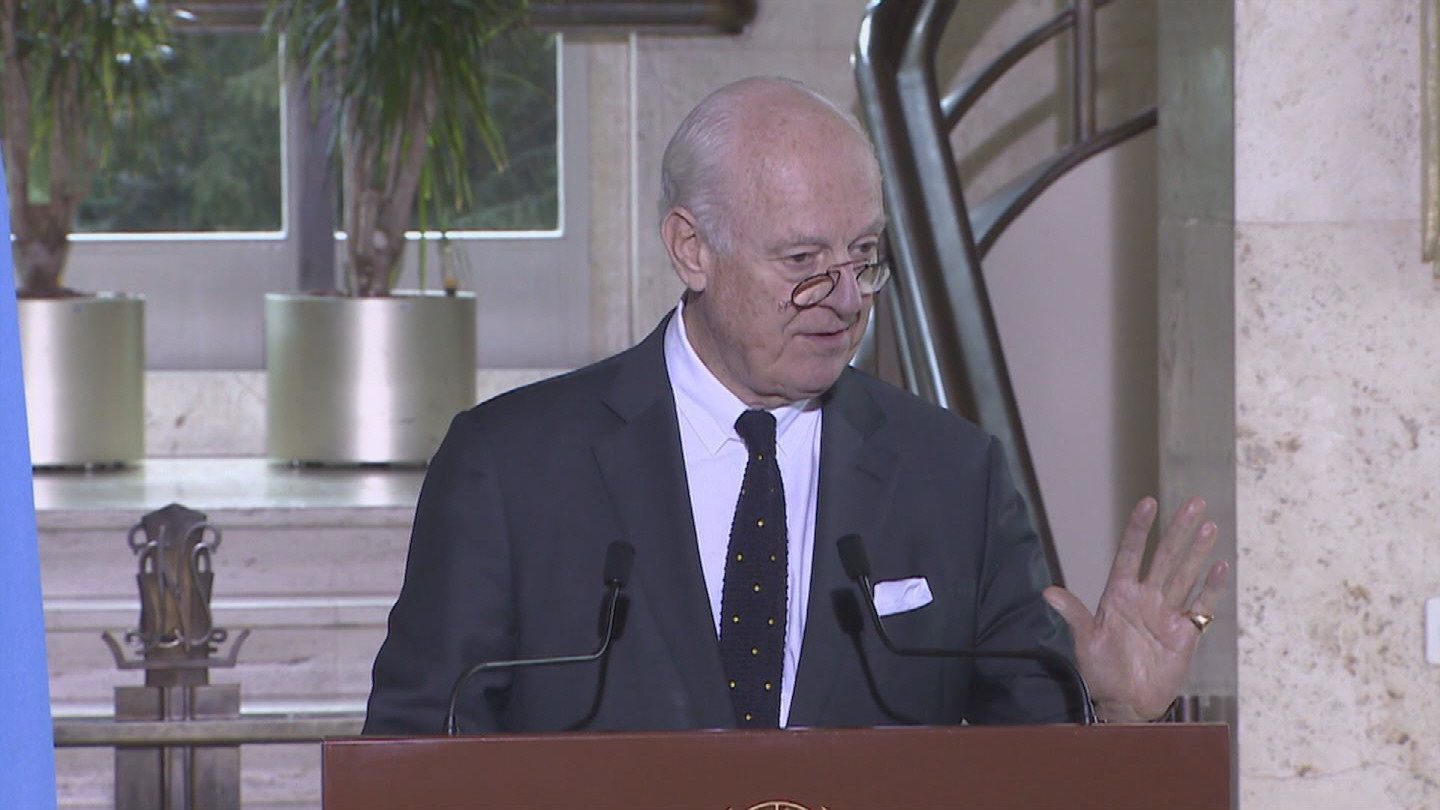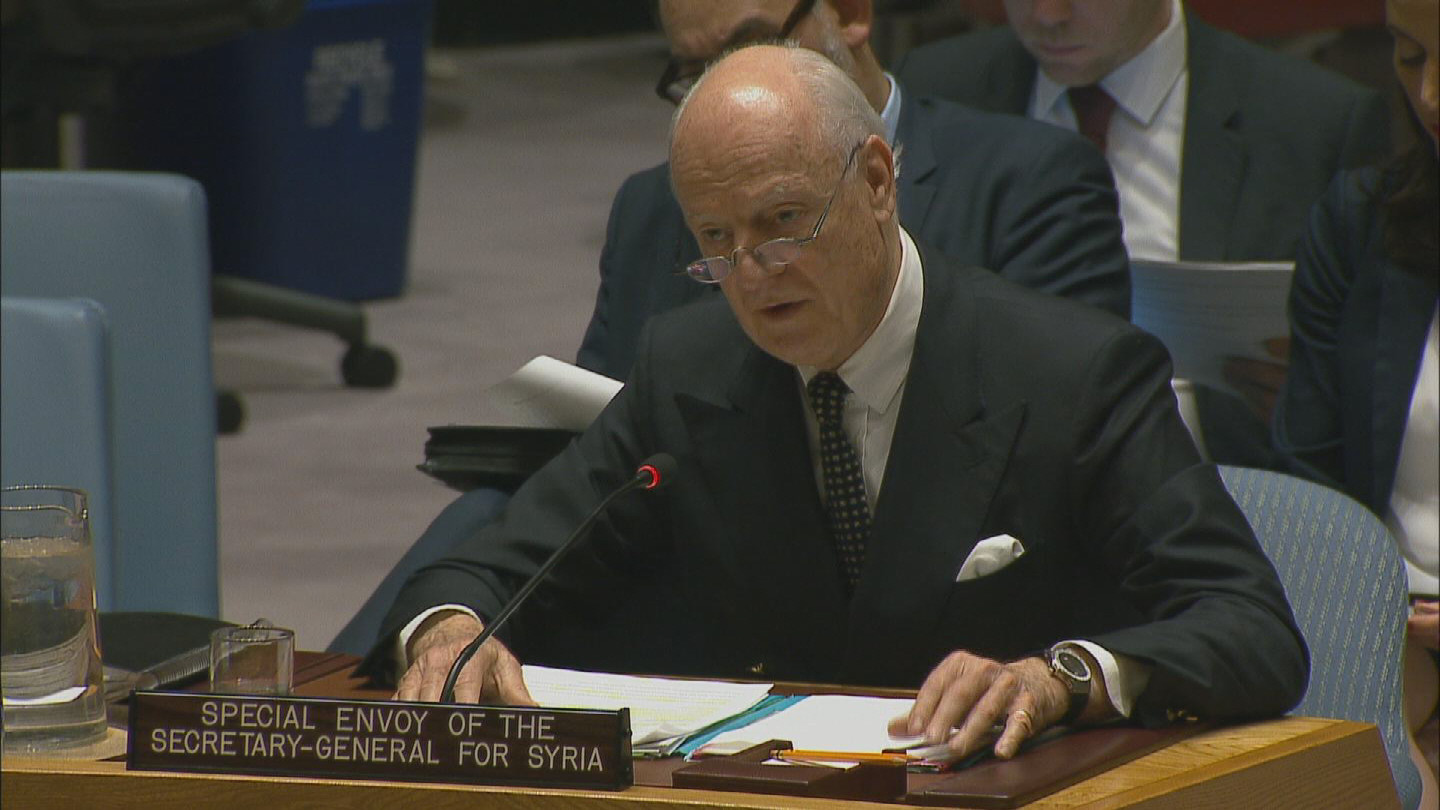GENEVA / SYRIA PRESSER
Download
There is no media available to download.
Share
STORY: GENEVA / SYRIA DE MISTURA
TRT: 03:12
SOURCE: UNTV CH
RESTRICTIONS: NONE
LANGUAGE: ENGLISH / NATS
DATELINE: 11 MAY 201, GENEVA, SWITZERLAND / RECENT
RECENT - GENEVA, SWITZERLAND
1. Wide shot, exterior Palais des Nations
11 MAY 201, GENEVA, SWITZERLAND
2. Wide shot, press stakeout
3. SOUNDBITE (English) Staffan de Mistura, UN Special Envoy for Syria:
“There is something different. The first one is, you must have seen it - I was in Astana, I witnessed it officially - there was a signature, a signature put on a paper by 3 guarantors. That symbolizes more than what is simply a verbal declaration. Secondly, the three countries which have been identifying themselves as guarantors do have, if they want to and if they put their own political weight behind it, the capacity of making this arrangement potentially working.”
4. Close up, UN logo
5. SOUNDBITE (English) Staffan de Mistura, UN Special Envoy for Syria:
“There is an alternative to that and the alternative would be simply to do nothing and have another 10 - god forbid - Aleppos. So against that background we had a touch of the will of optimism, whenever there is an initiative and this is a serious initiative, because we saw the negotiations to want to give it a chance.”
6. Close up, journalist
7. Wide shot, stakeout
8. SOUNDBITE (English) Jan Egeland, Special Advisor to the UN Special Envoy for Syria:
“The number of people in besieged area remains roughly the same; it is down some 20,000 people. It is now 625,000 people, still in 13 areas 80 per cent of those besieged in Syria live are besieged by government or allied forces.”
8. Close up, journalist taking photo
9. SOUNDBITE (English) Jan Egeland, Special Advisor to the UN Special Envoy for Syria:
“We have a big humanitarian muscle in Syria, other countries envy us. In Yemen we do not have that kind of pipeline, we do not have that kind of humanitarian program, we have not been funded generously to the same extent by donors than there. In Syria, however, we have such a tremendous access crisis, and protection crisis that the assistance arm cannot really function.”
10. Close up, camera
11. SOUNDBITE (English) Jan Egeland, Special Advisor to the UN Special Envoy for Syria:
“Is there hope? Yes, I think there is a hope here and it is connected now to the memorandum agreed in Astana on the 4th Mai. It says in no uncertain terms that not only will fighting cease hopefully and large parts of the de-escalation zones, but also rapid safe and unhindered humanitarian access shall be provided. Conditions to deliver medical aid to local populations and to meet basic needs of civilians shall be created.”
12. Close up, photographer
A few days ahead of a start of a new round of UN intra-Syrian talks to be held in Geneva, the United Nations' mediator for Syria, Staffan de Mistura, expressed cautious optimism about a the possibility of making progress, given current conditions.
Speaking to media today (11 May) in the Swiss city, the UN Special Envoy said, that “there is something different" in the relation between the parties concerned.
De Mistura said “the first one is, you must have seen it - I was in Astana, I witnessed it officially - there was a signature, a signature put on a paper by 3 guarantors. That symbolizes more than what is simply a verbal declaration." Secondly, he added, “the three countries which have been identifying themselves as guarantors do have, if they want to and if they put their own political weight behind it, the capacity of making this arrangement potentially working.”
During the last meeting in Astana, the three guarantors - Russia, Turkey, and Iran -- had agreed to set up four so-called de-escalation zones inside Syria. A week after the deal, the level of fighting and aerial attacks has already decreased in the war-torn country.
The UN Special Envoy added that “the alternative would be simply to do nothing and have another 10 - god forbid - Aleppos. So against that background we had a touch of the will of optimism, whenever there is an initiative and this is a serious initiative, because we saw the negotiations to want to give it a chance.”
During the press briefing Jan Egeland, Special Advisor to the UN Special Envoy for Syria, gave an update on the humanitarian situation in the country.
He said “the number of Syrian people living in hard-to-reach areas have gone from 5 million to now 4.5 million people” and added that “the number of people in besieged area remains roughly the same, it is down some 20,000 people, it is now 625,000 people. Still in 13 areas 80 per cent of those besieged in Syria live are besieged by government or allied forces.”
Egeland stated that 95,000 people living in Deir-ez-Zor are besieged by the so-called Islamic State; 12,000 citizens of Fouah and Kefraya are besieged by armed opposition groups; and around 10,000 people living in Yarmuk camp are twice besieged – by the government forces on the outside and internally by armed opposition groups.
According to the humanitarian advisor, around 350,000 people per week could be provided with aid with inter-agency cross line convoys. Egeland said that “we have a big humanitarian muscle in Syria, other countries envy us. In Yemen we do not have that kind of pipeline, we do not have that kind of humanitarian program, we have not been funded generously to the same extent by donors than there”. The problem in Syria, however, he said, is access and “we have such a tremendous access crisis, and protection crisis that the assistance arm cannot really function."
Despite the difficult situation to get permits from the government to get aid deliveries to the population in need, Egeland sees hope. He said “there is a hope here and it is connected now to the memorandum agreed in Astana on the 4th May.”
Egeland said “It says in no uncertain terms that not only will fighting cease hopefully and large parts of the de-escalation zones, but also rapid safe and unhindered humanitarian access shall be provided. Conditions to deliver medical aid to local populations and to meet basic needs of civilians shall be created.”









